Time Wars may refer to:
- Time War (Doctor Who), a conflict mentioned in the television series Doctor Who
- TimeWars , a series of science fiction novels by Simon Hawke
Time Wars may refer to:

Doctor Who is a British science fiction television series broadcast by the BBC since 1963. The series depicts the adventures of a Time Lord called the Doctor, an extraterrestrial being who appears to be human. The Doctor explores the universe in a time-travelling space ship called the TARDIS. The TARDIS exterior appears as a blue British police box, which was a common sight in Britain in 1963 when the series first aired. With various companions, the Doctor combats foes, works to save civilisations, and helps people in need.

The Daleks are a fictional extraterrestrial race of extremely xenophobic mutants principally portrayed in the British science fiction television programme Doctor Who. They were conceived by writer Terry Nation and first appeared in the 1963 Doctor Who serial The Daleks, in casings designed by Raymond Cusick.

Gallifrey, sometimes is a fictional planet in the long-running British science fiction television series Doctor Who. It is the original home world of the Time Lords, the civilisation to which the protagonist, the Doctor belongs. It is located in a binary star system 250 million light years from Earth.

The Time Lords are a fictional ancient race of extraterrestrial people in the British science fiction television series Doctor Who, of which the series' main protagonist, the Doctor, is a member. Time Lords are so named for their command of time travel technology and their non-linear perception of time. Originally, they were described as a powerful and wise race from the planet Gallifrey, from which the Doctor was a renegade; details beyond this were very limited for the first decade of the series. They later became integral to many episodes and stories as their role in the universe developed. For the first eight years after the series resumed in 2005, the Time Lords were said to have been destroyed during the Last Great Time War at some point in the show's continuity between the original series' cancellation in 1989 and the show's revival. In 2013, the 50th anniversary special "The Day of the Doctor" concerned this supposed destruction and their eventual survival.
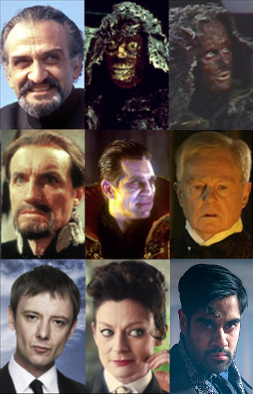
The Master, or "Missy" in their female incarnation, is a recurring character in the British science fiction television series Doctor Who and its associated spin-off works. They are a renegade alien Time Lord and the childhood friend and later archenemy of the title character, the Doctor. They were most recently portrayed by Sacha Dhawan.
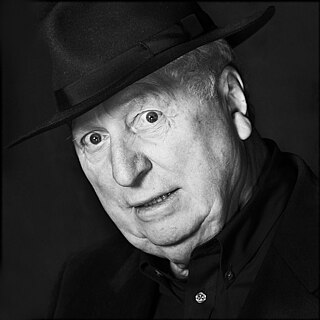
Thomas Stewart Baker is an English actor and writer. He played the fourth incarnation of the Doctor in the science fiction television series Doctor Who from 1974 to 1981.
Doctor or The Doctor may refer to:
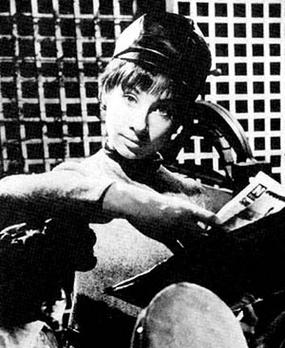
Susan Foreman is a fictional character in the British science fiction television series Doctor Who. The granddaughter of the Doctor and original companion of their first incarnation, she was played by actress Carole Ann Ford from 1963 to 1964, in the show's first season and the first two stories of the second season. Ford reprised the role for the feature-length 20th anniversary episode The Five Doctors (1983) and the 30th anniversary charity special Dimensions in Time (1993).

The Doctor is the title character in the long-running BBC science fiction television programme Doctor Who. Since the show's inception in 1963, the character has been portrayed by thirteen lead actors. In the programme, "the Doctor" is the alias assumed by a millennia-old humanoid alien, a Time Lord who travels through space and time in the TARDIS, frequently with companions. The transition to each succeeding actor is explained within the show's narrative through the plot device of "regeneration", a biological function of the Time Lord race that allows a change of cellular structure and appearance with recovery following a fatal injury.
The Time War, more specifically called the Last Great Time War, is a conflict within the fictional universe of the British science fiction television series Doctor Who. The war occurs between the events of the 1996 film and the 2005 revived series, with the Time Lords fighting the Daleks until the apparent mutual destruction of both races. The war was frequently mentioned when the show returned, but was not directly seen until the show's 50th anniversary special.
Damaged Goods is an original Doctor Who novel, released by Virgin Publishing in their New Adventures range of Doctor Who books in 1996. It was the first piece of full-length prose fiction to have been published by the television scriptwriter Russell T Davies, who later became the chief writer and executive producer of the Doctor Who television series when it was revived in 2005. Davies's first professionally published fiction, a novelisation of his children's television serial Dark Season, had been released by BBC Books in 1991.

The Eleventh Doctor is an incarnation of the Doctor, the protagonist of the BBC science fiction television series Doctor Who. He is played by Matt Smith in three series as well as five specials. As with previous incarnations of the Doctor, the character has also appeared in other Doctor Who spin-offs. Smith's portrayal of the Eleventh Doctor has been met with praise.

River Song is a fictional character created by Steven Moffat and played by Alex Kingston in the British science-fiction series Doctor Who. River Song was introduced to the series as an experienced future companion of series protagonist the Doctor, an alien Time Lord who travels through time in his TARDIS. Because River Song is a time traveller herself, her adventures with the Doctor occur out of synchronisation; their first meeting is with the Tenth Doctor, the Doctor's first and apparently her last. Kingston plays her in 15 episodes, as River becomes a companion, romantic interest and eventual wife of the Doctor in his eleventh incarnation portrayed by Matt Smith. From a production perspective, the Twelfth Doctor is the last incarnation to meet her, spending a 24-year-long night with her, before her first meeting with the Tenth Doctor. From the timeline perspective, the final time River meets with the Doctor, she is a hologram/echo from the library archives; She and the Eleventh Doctor part ways in the episode, "The Name of the Doctor".

The Ninth Doctor is an incarnation of the Doctor, the protagonist of the BBC science fiction television series Doctor Who. He is portrayed by Christopher Eccleston during the first series of the show's revival in 2005. Within the series' narrative, the Doctor is a centuries-old alien Time Lord from the planet Gallifrey who travels in time and space in the TARDIS, frequently with companions. At the end of life, the Doctor regenerates; as a result, the physical appearance and personality of the Doctor changes. Eccleston's Doctor was a war-torn loner who disguises his trauma brought on by the Time War using a sense of humour and determination to protect the innocent. The production team's approach to the character and Eccleston's portrayal were highlighted as being intentionally different from his predecessors, with Eccleston portraying the character as being less eccentric.
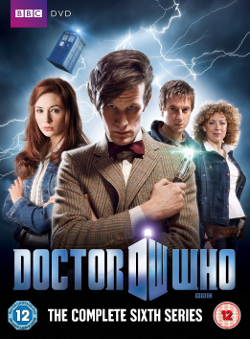
The sixth series of British science fiction television programme Doctor Who was shown in two parts. The first seven episodes were broadcast from April to June 2011, beginning with "The Impossible Astronaut" and ending with mid-series finale "A Good Man Goes to War". The final six episodes aired from August to October, beginning with "Let's Kill Hitler" and ending with "The Wedding of River Song". The main series was preceded by "A Christmas Carol", the 2010 Christmas special. The series was led by head writer and executive producer Steven Moffat, alongside executive producers Beth Willis and Piers Wenger. Sanne Wohlenberg, Marcus Wilson, and Denise Paul served as producers. The series was the sixth to air following the programme's revival in 2005 after the classic era aired between 1963 and 1989, and is the thirty-second season overall.
"A Good Man Goes to War" is the seventh episode of the sixth series of the British science fiction television series Doctor Who, and was first broadcast on BBC One on 4 June 2011. It served as a mid-series finale. The episode was written by Steven Moffat and directed by Peter Hoar.

"The Day of the Doctor" is a special episode of the British science fiction television programme Doctor Who, marking the programme's 50th anniversary. It was written by Steven Moffat, who served as an executive producer alongside Faith Penhale. It was shown on BBC One on 23 November 2013, in both 2D and 3D. The special was broadcast simultaneously in 94 countries, and was shown concurrently in 3D in some cinemas. It achieved the Guinness World Record for the largest ever simulcast of a TV drama and won the Radio Times Audience Award at the 2014 British Academy Television Awards.
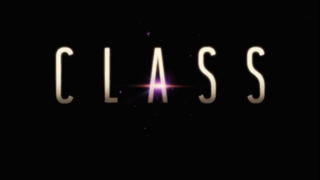
Class is a British science fiction drama programme and a spin-off of the long-running programme Doctor Who. It was created and written by Patrick Ness, who also produced alongside Doctor Who showrunner and lead writer Steven Moffat, and Brian Minchin, who acted as producer on Doctor Who and two of its previous spin-offs, Torchwood and The Sarah Jane Adventures.